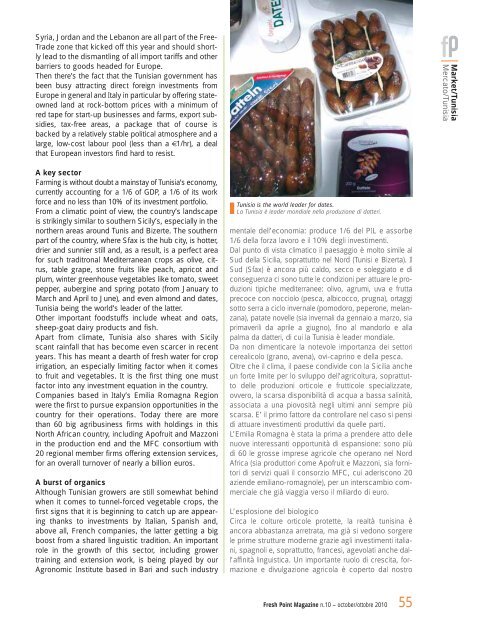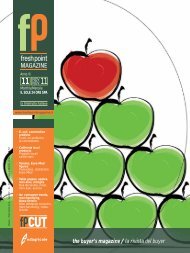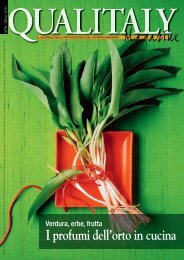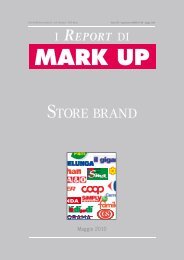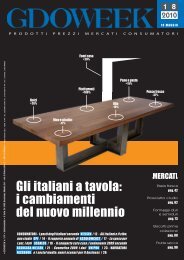Fresh Point Magazine - B2B24 - Il Sole 24 Ore
Fresh Point Magazine - B2B24 - Il Sole 24 Ore
Fresh Point Magazine - B2B24 - Il Sole 24 Ore
Create successful ePaper yourself
Turn your PDF publications into a flip-book with our unique Google optimized e-Paper software.
Syria, Jordan and the Lebanon are all part of the Free-<br />
Trade zone that kicked off this year and should shortly<br />
lead to the dismantling of all import tariffs and other<br />
barriers to goods headed for Europe.<br />
Then there’s the fact that the Tunisian government has<br />
been busy attracting direct foreign investments from<br />
Europe in general and Italy in particular by offering stateowned<br />
land at rock-bottom prices with a minimum of<br />
red tape for start-up businesses and farms, export subsidies,<br />
tax-free areas, a package that of course is<br />
backed by a relatively stable political atmosphere and a<br />
large, low-cost labour pool (less than a €1/hr), a deal<br />
that European investors find hard to resist.<br />
A key sector<br />
Farming is without doubt a mainstay of Tunisia’s economy,<br />
currently accounting for a 1/6 of GDP, a 1/6 of its work<br />
force and no less than 10% of its investment portfolio.<br />
From a climatic point of view, the country’s landscape<br />
is strikingly similar to southern Sicily’s, especially in the<br />
northern areas around Tunis and Bizerte. The southern<br />
part of the country, where Sfax is the hub city, is hotter,<br />
drier and sunnier still and, as a result, is a perfect area<br />
for such traditronal Mediterranean crops as olive, citrus,<br />
table grape, stone fruits like peach, apricot and<br />
plum, winter greenhouse vegetables like tomato, sweet<br />
pepper, aubergine and spring potato (from January to<br />
March and April to June), and even almond and dates,<br />
Tunisia being the world’s leader of the latter.<br />
Other important foodstuffs include wheat and oats,<br />
sheep-goat dairy products and fish.<br />
Apart from climate, Tunisia also shares with Sicily<br />
scant rainfall that has become even scarcer in recent<br />
years. This has meant a dearth of fresh water for crop<br />
irrigation, an especially limiting factor when it comes<br />
to fruit and vegetables. It is the first thing one must<br />
factor into any investment equation in the country.<br />
Companies based in Italy’s Emilia Romagna Region<br />
were the first to pursue expansion opportunities in the<br />
country for their operations. Today there are more<br />
than 60 big agribusiness firms with holdings in this<br />
North African country, including Apofruit and Mazzoni<br />
in the production end and the MFC consortium with<br />
20 regional member firms offering extension services,<br />
for an overall turnover of nearly a billion euros.<br />
A burst of organics<br />
Although Tunisian growers are still somewhat behind<br />
when it comes to tunnel-forced vegetable crops, the<br />
first signs that it is beginning to catch up are appearing<br />
thanks to investments by Italian, Spanish and,<br />
above all, French companies, the latter getting a big<br />
boost from a shared linguistic tradition. An important<br />
role in the growth of this sector, including grower<br />
training and extension work, is being played by our<br />
Agronomic Institute based in Bari and such industry<br />
Tunisia is the world leader for dates.<br />
La Tunisia è leader mondiale nella produzione di datteri.<br />
mentale dell’economia: produce 1/6 del PIL e assorbe<br />
1/6 della forza lavoro e il 10% degli investimenti.<br />
Dal punto di vista climatico il paesaggio è molto simile al<br />
Sud della Sicilia, soprattutto nel Nord (Tunisi e Bizerta). <strong>Il</strong><br />
Sud (Sfax) è ancora più caldo, secco e soleggiato e di<br />
conseguenza ci sono tutte le condizioni per attuare le produzioni<br />
tipiche mediterranee: olivo, agrumi, uva e frutta<br />
precoce con nocciolo (pesca, albicocco, prugna), ortaggi<br />
sotto serra a ciclo invernale (pomodoro, peperone, melanzana),<br />
patate novelle (sia invernali da gennaio a marzo, sia<br />
primaverili da aprile a giugno), fino al mandorlo e alla<br />
palma da datteri, di cui la Tunisia è leader mondiale.<br />
Da non dimenticare la notevole importanza dei settori<br />
cerealicolo (grano, avena), ovi-caprino e della pesca.<br />
Oltre che il clima, il paese condivide con la Sicilia anche<br />
un forte limite per lo sviluppo dell’agricoltura, soprattutto<br />
delle produzioni orticole e frutticole specializzate,<br />
ovvero, la scarsa disponibilità di acqua a bassa salinità,<br />
associata a una piovosità negli ultimi anni sempre più<br />
scarsa. E’ il primo fattore da controllare nel caso si pensi<br />
di attuare investimenti produttivi da quelle parti.<br />
L’Emilia Romagna è stata la prima a prendere atto delle<br />
nuove interessanti opportunità di espansione: sono più<br />
di 60 le grosse imprese agricole che operano nel Nord<br />
Africa (sia produttori come Apofruit e Mazzoni, sia fornitori<br />
di servizi quali il consorzio MFC, cui aderiscono 20<br />
aziende emiliano-romagnole), per un interscambio commerciale<br />
che già viaggia verso il miliardo di euro.<br />
L’esplosione del biologico<br />
Circa le colture orticole protette, la realtà tunisina è<br />
ancora abbastanza arretrata, ma già si vedono sorgere<br />
le prime strutture moderne grazie agli investimenti italiani,<br />
spagnoli e, soprattutto, francesi, agevolati anche dall’affinità<br />
linguistica. Un importante ruolo di crescita, formazione<br />
e divulgazione agricola è coperto dal nostro<br />
<strong>Fresh</strong> <strong>Point</strong> <strong>Magazine</strong> n.10 – october/ottobre 2010<br />
55<br />
Market/Tunisia<br />
Mercato/Tunisia


